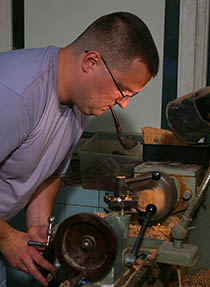Sasha Bondarev 🇱🇻 🇪🇺 Latvian pipe maker
I started making pipes in 2011, and now it's my only job. I make about 5 to 8 pipes per month, spending 2 to 3 working days on each one.
For my pipes I use Italian briar and German ebonite or acrylic rods. I pay special attention to pipe engineering: accurate drilling, fine stem fitting, comfortable mouthpiece button, deep V-slot.
Every single one of my pipes provides a perfect smoking experience. Just try one of them, and I’m sure you will want to get a second one soon.


























